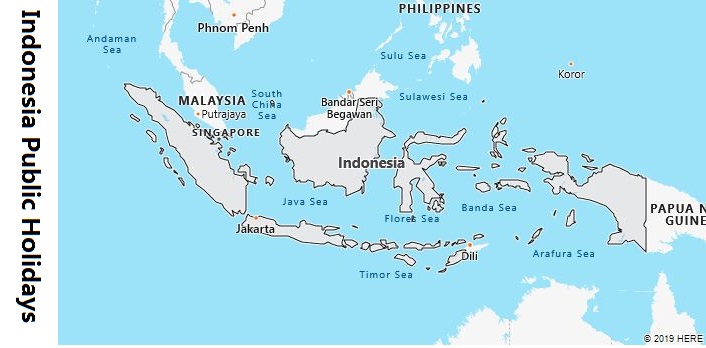Indonesia Public Holidays
Indonesia Public Holidays
Searching for the national holidays in Indonesia? All public holidays in Indonesia are treated like Sundays. This means that most of the Indonesia employees have a day off and all schools are closed on these office holidays. If you are planning a trip to Indonesia and want to know what the national and regional holidays are, check the details in the tables below.
Indonesia, the largest archipelago in the world, is a nation known for its diverse cultures, ethnicities, and religions. This diversity is reflected in the country’s public holidays, which include a combination of national holidays, religious holidays, and commemorative days. These holidays celebrate Indonesia’s independence, religious traditions, and significant cultural events. The public holidays offer insights into Indonesia’s pluralistic society, where people from various religious and cultural backgrounds come together in celebration.
National Public Holidays
National public holidays in Indonesia celebrate the country’s independence, historical milestones, and key political events. These holidays foster a sense of national pride and unity, as Indonesians commemorate their struggles for freedom and sovereignty.
Independence Day (17th August)
Independence Day, celebrated on the 17th of August, is Indonesia’s most important national holiday. It marks the day in 1945 when Indonesia declared its independence from Dutch colonial rule.
Celebrations:
- Flag Raising Ceremonies: The central event of Independence Day is the flag-raising ceremony, known as Upacara Bendera, held across the country. In Jakarta, the main ceremony takes place at the Presidential Palace, attended by the President, government officials, and foreign dignitaries. Citizens also participate in flag-raising ceremonies in schools, government offices, and public spaces.
- Carnivals and Parades: Across Indonesia, parades and carnivals are organized to celebrate the nation’s independence. These parades often feature traditional music, dances, and performances that showcase Indonesia’s rich cultural diversity.
- Competitions and Games: A beloved tradition on Independence Day is the organization of community games, known as Lomba 17 Agustus. Popular games include panjat pinang (climbing a greased pole), balap karung (sack races), and eating crackers competitions. These games foster a sense of camaraderie and unity among participants.
- Fireworks and Festivities: In the evening, fireworks displays light up the skies over major cities, with public squares and parks filled with people celebrating with music, food, and performances.
Heroes’ Day (10th November)
Heroes’ Day, or Hari Pahlawan, is observed on the 10th of November each year to honor Indonesia’s national heroes who fought for the country’s independence. The holiday commemorates the Battle of Surabaya in 1945, a key moment in Indonesia’s struggle against Dutch forces.
Key Events:
- Memorial Ceremonies: The day is marked by official ceremonies at war memorials and cemeteries, where government officials lay wreaths in honor of fallen heroes. The largest ceremony takes place at the Heroes Cemetery in Surabaya, where the battle took place.
- Public Speeches: Government leaders, including the President, deliver speeches reflecting on the sacrifices made by Indonesia’s heroes and emphasizing the importance of patriotism and national unity.
- Educational Programs: Schools and universities hold special programs and lectures to educate students about the significance of Heroes’ Day and Indonesia’s fight for independence.
Youth Pledge Day (28th October)
Youth Pledge Day, or Hari Sumpah Pemuda, commemorates the pledge made by young Indonesian nationalists in 1928 to unite the country under one language, one nation, and one homeland—Indonesia. This day is a symbol of national unity and the importance of the youth in the country’s independence movement.
Observances:
- Cultural Performances: On Youth Pledge Day, cultural performances are held in schools, community centers, and public spaces, celebrating Indonesia’s diverse cultural heritage and the spirit of unity that the pledge symbolizes.
- Speeches and Parades: Youth organizations and government officials deliver speeches about the role of young people in building the nation’s future. Parades and other public events are organized to mark the day.
Religious Public Holidays
Indonesia is home to multiple religions, including Islam, Christianity, Hinduism, and Buddhism. As a result, the country observes several religious holidays that reflect the country’s religious diversity. These holidays are widely celebrated and respected across the nation, with each religious group participating in their own unique ways.
Eid al-Fitr (Hari Raya Idul Fitri)
Eid al-Fitr, known as Hari Raya Idul Fitri in Indonesia, is one of the most important Islamic holidays. It marks the end of Ramadan, the Islamic holy month of fasting, and is a time for celebration, forgiveness, and family gatherings.
Traditions:
- Eid Prayers: On the morning of Eid al-Fitr, Muslims in Indonesia gather at mosques or large prayer grounds to perform special prayers, known as Salat Idul Fitri. These prayers are followed by sermons that emphasize the importance of gratitude, charity, and forgiveness.
- Visiting Family and Relatives: A key tradition during Eid al-Fitr is mudik, the annual homecoming journey, where Indonesians travel from urban centers to their hometowns to celebrate the holiday with family. Families come together to ask for forgiveness, known as halal bi halal, and strengthen familial bonds.
- Feasting and Sharing: Traditional Indonesian dishes, such as ketupat (rice cakes wrapped in coconut leaves), opor ayam (chicken in coconut milk), and rendang (spicy beef stew), are prepared and shared with loved ones. It is also customary to give money or gifts to children, known as angpao.
- Charity (Zakat al-Fitr): Before the Eid prayers, Muslims give Zakat al-Fitr, a form of charity that ensures the less fortunate can also partake in the celebrations.
Eid al-Adha (Hari Raya Idul Adha)
Eid al-Adha, or Hari Raya Idul Adha, is another major Islamic holiday in Indonesia. It commemorates the willingness of Prophet Ibrahim (Abraham) to sacrifice his son in obedience to God. The holiday is observed about 70 days after Eid al-Fitr and is marked by acts of charity and sacrifice.
Celebrations:
- Animal Sacrifice: One of the central traditions of Eid al-Adha is the sacrifice of an animal, usually a goat or cow, in remembrance of Prophet Ibrahim’s sacrifice. The meat is divided into three parts: one for the family, one for friends and neighbors, and one for the poor.
- Eid Prayers: Similar to Eid al-Fitr, Muslims gather for prayers at mosques or prayer grounds, followed by sermons on the themes of sacrifice, faith, and compassion.
- Charity and Generosity: Charity is an important aspect of Eid al-Adha, with many Indonesians donating to those in need. The meat from the sacrificial animals is distributed to underprivileged families.
Nyepi (Balinese Day of Silence)
Nyepi, also known as the Balinese Day of Silence, is a Hindu holiday celebrated primarily on the island of Bali. It marks the Balinese New Year according to the Saka calendar and is a day of silence, fasting, and self-reflection.
Key Traditions:
- Day of Silence: Nyepi is observed by a complete shutdown of activities on the island of Bali. Streets are empty, and businesses are closed. No lights, entertainment, or travel is permitted. The purpose of this day is to purify the island and its inhabitants by driving away evil spirits.
- Meditation and Fasting: Balinese Hindus spend the day in meditation and fasting, reflecting on their actions over the past year and setting intentions for the coming year.
- Ogoh-Ogoh Parade (Preceding Day): The night before Nyepi, large papier-mâché effigies called Ogoh-Ogoh, representing demons and evil spirits, are paraded through the streets in a vibrant celebration. The effigies are later burned to symbolize the purification of the environment from negative forces.
Christmas Day (Hari Natal)
Christmas Day, celebrated on the 25th of December, is a public holiday in Indonesia, primarily observed by the Christian minority. It is a time of religious devotion, family gatherings, and sharing.
Celebrations:
- Church Services: On Christmas Eve and Christmas Day, Christians attend church services, which include prayers, hymns, and sermons that celebrate the birth of Jesus Christ.
- Family Gatherings: Families come together to enjoy festive meals and exchange gifts. In some regions, especially in eastern Indonesia, traditional dishes such as babi guling (roast pig) or ikan bakar (grilled fish) are prepared.
- Christmas Decorations: Homes, churches, and public places are decorated with Christmas trees, lights, and nativity scenes. In cities like Jakarta, malls and shopping centers also join in the festive spirit with elaborate decorations and special events.
Commemorative Days
In addition to national and religious holidays, Indonesia observes several commemorative days that highlight important moments in the country’s history and its contributions to the global community. These days provide opportunities for reflection on national achievements and international solidarity.
Pancasila Day (1st June)
Pancasila Day, celebrated on the 1st of June, commemorates the founding of Pancasila, Indonesia’s official state philosophy, which emphasizes five core principles: belief in one God, just and civilized humanity, Indonesian unity, democracy, and social justice.
Observances:
- Official Ceremonies: Pancasila Day is marked by ceremonies across the country, including flag-raising events and speeches by government officials. The President often delivers a speech about the importance of Pancasila in promoting national unity and guiding Indonesia’s development.
- Educational Programs: Schools and universities organize programs to educate students about Pancasila and its role in shaping Indonesia’s identity as a pluralistic and democratic nation.
Kartini Day (21st April)
Kartini Day, observed on the 21st of April, celebrates the legacy of Raden Ajeng Kartini, a national hero who fought for women’s rights and education in Indonesia during the late 19th and early 20th centuries.
Key Traditions:
- School Events: On Kartini Day, schools often hold special events where students dress in traditional clothing and participate in activities that honor Kartini’s contributions to women’s empowerment. Essay competitions, debates, and cultural performances are common ways of celebrating her legacy.
- Public Awareness Campaigns: Various organizations use Kartini Day as an opportunity to promote gender equality and raise awareness about the challenges faced by women in modern Indonesia.
Human Rights Day (10th December)
Human Rights Day, observed on the 10th of December, commemorates the adoption of the Universal Declaration of Human Rights by the United Nations in 1948. In Indonesia, this day is used to raise awareness about human rights issues and to promote equality and justice for all citizens.
Observances:
- Public Rallies and Campaigns: Human rights organizations, NGOs, and activists hold public rallies, seminars, and discussions to advocate for the protection of human rights in Indonesia. Issues such as freedom of speech, gender equality, and workers’ rights are often highlighted.
- Government Initiatives: The government may organize events or programs aimed at promoting human rights and addressing challenges related to discrimination or inequality.















































